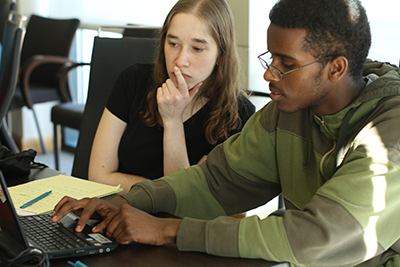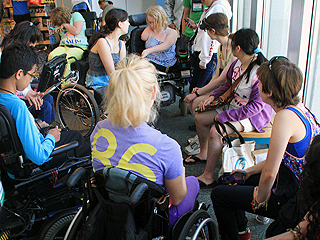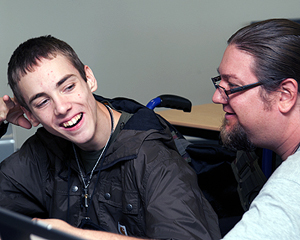Communities of Practice

The DO-IT Center at the University of Washington hosts online Communities of Practice (CoPs) for multiple stakeholder groups. Communicating using email, members of CoPs share perspectives and expertise and identify practices that promote the participation and success of people with disabilities in education and careers.
You can join any of the CoPs listed below by sending to doit@uw.edu the name of the CoP(s) you would like to join along with the following information:
- Name
- Position/Title
- Institution
- Postal Address
- Email Address
CoPs
- AccessCyberlearning
- AccessERC
- Accessible Distance Learning
- Accessible Information Technology
- Broadening Participation
- Computing Faculty, Administrator, and Employer
- Disability Services
- DO-IT International
- STEMed
- Universal Design in Higher Education
- Veterans
AccessCyberlearning CoP
AccessCyberlearning Community of Practice engages with other Cyberlearning projects on how new technologies and strategies for the delivery of online instruction can be made accessible to students and instructors with disabilities.
AccessERC CoP
Populated with individuals who work at NSF-funded Engineering Research Centers across the United States, members:
- discuss how to recruit participants with disabilities and accommodate them in their programs and activities;
- recruit their student participants with disabilities into disability-related e-mentoring, internships, and workshops to complement their activities;
- discuss the implementation of universal design to make facilities, products, and activities more welcoming and accessible to individuals with disabilities;
- discuss best practices and resources identified at capacity-building institutes; and
- share ideas about seed grants, new initiatives, and lessons learned.
Accessible Distance Learning CoP
Distance learning program administrators and support staff use the Accessible Distance Learning CoP to increase their knowledge about disabilities and make changes in distance learning that lead to more inclusive practices. Members discuss:
- management;
- staffing;
- training; and
- policy issues related to creating accessible distance learning courses and programs.
Accessible Information Technology CoP
This CoP is populated with disability services and IT professionals interested in increasing the accessibility of IT in postsecondary education. Participants
- exchange information, ideas, and suggestions for future collaboration;
- gain and share knowledge and help identify issues related to IT accessibility in higher education;
- recruit others to participate in the CoP; and
- provide content for DO-IT’s searchable Knowledge Base.
Broadening Participation CoP
Populated with individuals who administer projects that serve to broaden participation in science, technology, engineering, and math fields, members:
- discuss how to recruit participants with disabilities and accommodate them in their programs and activities and to make their offerings more accessible overall;
- recruit their participants with disabilities into disability-related e-mentoring, internships, academies, and workshops to complement their activities;
- co-sponsor events and discuss potential new projects and share funding possibilities;
- disseminate information about their projects and results through the Knowledge Base; and
- help plan and recruit participants for Capacity-Building Institutes.

Computing Faculty, Administrators, and Employers CoP
Computing professionals, faculty, and administrators as well as representatives from industry and professional organizations use the Computing Faculty, Administrator, and Employer CoP to increase their knowledge about disabilities and make changes in computing departments that lead to more inclusive practices. Participants:
- gain and share knowledge and help identify issues related to the underrepresentation of people with disabilities in computing fields;
- help identify, field test, and Computing Department Accessibility Indicators to make computing departments more welcoming and accessible to students with disabilities;
- help organizations make their websites accessible to visitors with disabilities, their conferences accessible to attendees with disabilities, and their conference programs inclusive of disability-related topics;
- help plan, attend, and recruit others to attend Capacity-Building Institutes;
- identify campus computing events to which students with disabilities might be invited;
- discuss how to include accessibility topics in postsecondary computing curriculum;
- discuss issues and help locate Ph.D. graduates with disabilities to recruit as faculty;
- provide connections with computing faculty and industry for internships; and
- help staff target disability-related articles to computing publications.
Disability Services CoP
Comprised of disability service professionals from community and technical colleges, four-year colleges, and universities nationwide, together with their networks of postsecondary and K-12 schools (e.g., affiliates of Association on Higher Education and Disability and parent groups (e.g., affiliates of Parent Advocacy Coalition for Educational Rights Center, members of this CoP:
- recruit high school and college students with disabilities for academies and workshops, e-mentoring communities, internships, and other activities;
- deliver presentations to faculty in order to share information about accommodations and campus services for students with disabilities;
- work with educators and administrators to invite students with disabilities to career fairs, lectures, and other events; work with groups to make sure activities are accessible; and help bring speakers with disabilities and exhibits that focus on disability-related topics;
- develop transition and bridge workshops and help other CoP members develop such activities;
- help plan, and recruit participants for Capacity-Building Institutes; and
- provide content for the searchable Knowledge Base.
DO-IT International CoP
This list supports discussions between researchers and practitioners who wish to implement DO-IT practices. They include:
- Developing a support program for youth with disabilities that includes residential study on a college campus, in-person and online peer and mentor support, internships and other work-based learning, and access to computers and assistive technology.
- Promoting the development of and use of technology for people with disabilities.
- Encouraging the practice of universal design of instruction, physical spaces, technology, and services.
- Employing strategies to promote institutional change.

STEMed CoP
This CoP is populated with K-12 and postsecondary educators and administrators interested in promoting the success of students and employees with disabilities of science, technology, engineering, and math (STEM) courses and careers. Participants:
- gain and share knowledge and help identify issues related to the underrepresentation of people with disabilities in STEM fields;
- introduce DO-IT staff to administrators of professional STEM departments and organizations so that staff can help these organizations make their websites accessible, their conferences accessible to attendees with disabilities, and their programs inclusive of disability-related topics;
- help plan, attend, and recruit others to attend Capacity-Building Institutes;
- identify STEM events to which employees and students with disabilities might be invited;
- discuss how to include accessibility topics in STEM curricula and STEM workplaces;
- provide connections with STEM faculty and industry for internships; and
- help DO-IT staff target articles to STEM publications.
Universal Design in Higher Education CoP
This CoP is comprised of individuals interested in exploring universal design (UD) and its applications in higher education. Participants on this CoP discuss the following topics:
- promising practices for infusing universal design on postsecondary campuses
- applying UD to all educational opportunities that include instruction, technology, student services and physical spaces
- specific topics in the books Creating Inclusive Learning Opportunities in Higher Education: A Universal Design Toolkit and Universal Design and Higher Education: From Principles to Practice, 2nd edition. Participants will also be invited to contribute materials to be shared through the Center on Universal Design in Education.
Veterans CoP
Populated by veterans with disabilities, service providers, and volunteer mentors, members of this CoP:
- interact regularly to improve service to veterans with disabilities and their families;
- discuss how to recruit veterans with disabilities and accommodate them in their programs and activities;
- devise solutions that increase the accessibility of their program offerings;
- develop internships, academies, and workshops to complement their program activities;
- co-sponsor events, discuss potential projects, and share funding possibilities;
- help plan and recruit participants for Capacity-Building Institutes;
- share common concerns in their practices;
- identify problems, goals, and resources;
- assess change; and
- form collaborations.